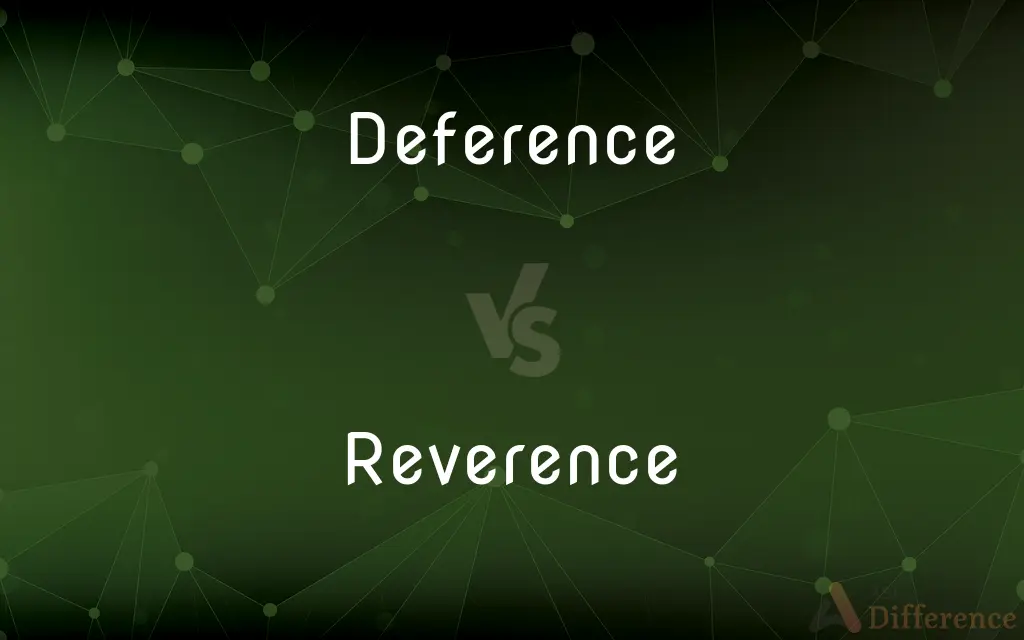Deference vs. Reverence — What's the Difference?
Edited by Tayyaba Rehman — By Urooj Arif — Updated on April 16, 2024
Deference implies a respectful submission or yielding to the judgment of another, often in recognition of expertise or hierarchy, whereas reverence is a deep respect tinged with awe, often reserved for something sacred or highly esteemed.

Difference Between Deference and Reverence
Table of Contents
ADVERTISEMENT
Key Differences
Deference involves a respectful acknowledgment of another person's authority or superiority, often demonstrated through actions like yielding or giving way. On the other hand, reverence encompasses a profound respect mixed with awe and devotion, typically directed towards something or someone considered sacred or exalted.
While deference is usually shown in social or hierarchical interactions, indicating recognition of someone’s higher status or expertise, reverence is more emotional and spiritual, reflecting deep admiration that can border on veneration.
Deference can be seen in professional or formal settings where protocol dictates a lower-ranking person respects a higher-ranking one. In contrast, reverence is often expressed in personal beliefs and practices, such as religious worship or towards highly respected figures.
In terms of behavior, deference is exhibited by gestures like bowing, allowing someone else to speak first, or following someone else’s lead. Conversely, reverence might involve rituals, prayers, or other forms of profound homage.
While deference is context-dependent and may change based on the situation or relationship dynamics, reverence tends to be more consistent, driven by enduring values and beliefs about the revered object or person.
ADVERTISEMENT
Comparison Chart
Definition
Respectful submission to authority
Deep respect with awe
Context
Social, hierarchical
Emotional, spiritual
Expression
Gestures, yielding
Rituals, homage
Emotional Intensity
Moderate, situational
High, consistent
Typical Objects
Superiors, experts
Sacred figures, esteemed objects
Compare with Definitions
Deference
Submission to judgment.
The team acted in deference to the coach’s strategic plan.
Reverence
Feeling of awe inspired by greatness or beauty.
She felt a sense of reverence as she watched the sun set over the ocean.
Deference
Complying with someone’s wishes.
He took off his shoes in deference to the house rules.
Reverence
Deep respect and admiration.
The poet’s works are held in reverence by literature enthusiasts.
Deference
Courteous regard for people's feelings.
In deference to the guests' dietary restrictions, the menu was adjusted.
Reverence
Honor or homage directed towards a deity or sacred entity.
The shrine was a place of reverence for the villagers.
Deference
Acknowledgment of precedence.
The junior senator paused in deference to the senior senator’s experience.
Reverence
A gesture indicating deep respect.
He bowed his head in reverence during the ceremony.
Deference
Respectful yielding to another's opinion or decision.
She showed deference to her mentor by adopting his recommendations.
Reverence
Profound veneration expressed through actions or words.
His biography was written with reverence for the leader’s legacy.
Deference
Deference (also called submission or passivity) is the condition of submitting to the espoused, legitimate influence of one's superior or superiors. Deference implies a yielding or submitting to the judgment of a recognized superior, out of respect or reverence.
Reverence
A feeling of profound awe and respect and often love.
Deference
Polite submission and respect
He addressed her with the deference due to age
Reverence
An act showing respect, especially a bow or curtsy.
Deference
Submission or courteous respect given to another, often in recognition of authority.
Reverence
Reverence Used as a form of address for certain members of the Christian clergy
Your Reverence.
Deference
Great respect.
The children treated their elders with deference.
Reverence
To consider or treat with profound awe and respect; venerate
"There was nobody whom she reverenced as she reverenced him" (Virginia Woolf).
Deference
The willingness to carry out the wishes of others.
By tidying his room, he showed deference to his mother.
Reverence
Veneration; profound awe and respect, normally in a sacred context.
Deference
A yielding of judgment or preference from respect to the wishes or opinion of another; submission in opinion; regard; respect; complaisance.
Deference to the authority of thoughtful and sagacious men.
Deference is the most complicate, the most indirect, and the most elegant of all compliments.
Reverence
An act of showing respect, such as a bow.
Deference
A courteous expression (by word or deed) of esteem or regard;
His deference to her wishes was very flattering
Be sure to give my respects to the dean
Reverence
The state of being revered.
Deference
Courteous regard for people's feelings;
In deference to your wishes
Out of respect for his privacy
Reverence
A form of address for some members of the clergy.
Your reverence
Deference
A disposition or tendency to yield to the will of others
Reverence
That which deserves or exacts manifestations of reverence; reverend character; dignity; state.
Reverence
(transitive) To show or feel reverence to.
Reverence
Profound respect and esteem mingled with fear and affection, as for a holy being or place; the disposition to revere; veneration.
If thou be poor, farewell thy reverence.
Reverence, which is the synthesis of love and fear.
When discords, and quarrels, and factions, are carried openly and audaciously, it is a sign the reverence of government islost.
Reverence
The act of revering; a token of respect or veneration; an obeisance.
Make twenty reverences upon receiving . . . about twopence.
And each of them doeth all his diligenceTo do unto the feast reverence.
Reverence
That which deserves or exacts manifestations of reverence; reverend character; dignity; state.
I am forced to lay my reverence by.
Reverence
A person entitled to be revered; - a title applied to priests or other ministers with the pronouns his or your; sometimes poetically to a father.
Such a one as a man may not speak of, without he say. "Sir reverence."
Now lies he there,And none so poor to do him reverence.
Reverence
To regard or treat with reverence; to regard with respect and affection mingled with fear; to venerate.
Let . . . the wife see that she reverence her husband.
Those that I reverence those I fear, the wise.
Reverence
A profound emotion inspired by a deity;
The fear of God
Reverence
A reverent mental attitude
Reverence
Regard with feelings of respect and reverence; consider hallowed or exalted or be in awe of;
Fear God as your father
We venerate genius
Common Curiosities
Is deference always required in professional settings?
In many professional settings, deference to superiors or experts is expected as a sign of respect and protocol.
How do cultural differences impact the expression of deference or reverence?
Cultural norms significantly dictate how deference and reverence are shown, with variations in gestures, language, and practices.
Does deference imply inferiority?
Deference does not necessarily imply inferiority but acknowledges a difference in status or expertise.
What are typical gestures of reverence?
Gestures like bowing, kneeling, or performing rituals are common expressions of reverence.
What is the main difference between deference and reverence?
Deference is about respectful submission often in a hierarchy, while reverence involves deep respect mixed with awe, usually toward something considered sacred.
Can deference and reverence coexist in one situation?
Yes, one can show deference to a religious leader by yielding to their authority, while also holding them in reverence for their spiritual role.
What are typical gestures of deference?
Typical gestures include nodding, allowing others to speak first, or following another’s lead.
Can a person demand deference or reverence from others?
While one might expect or require deference in certain roles, reverence cannot be demanded as it is based on genuine respect and awe.
How does age affect deference and reverence?
Older individuals often receive deference and young individual receive reverence due to their age and gender difference.
Is reverence associated only with religion?
While often associated with religion, reverence can also be directed toward any greatly respected or admired entity or person.
Share Your Discovery

Previous Comparison
Strife vs. Struggle
Next Comparison
Thoughtful vs. InsightfulAuthor Spotlight
Written by
Urooj ArifUrooj is a skilled content writer at Ask Difference, known for her exceptional ability to simplify complex topics into engaging and informative content. With a passion for research and a flair for clear, concise writing, she consistently delivers articles that resonate with our diverse audience.
Edited by
Tayyaba RehmanTayyaba Rehman is a distinguished writer, currently serving as a primary contributor to askdifference.com. As a researcher in semantics and etymology, Tayyaba's passion for the complexity of languages and their distinctions has found a perfect home on the platform. Tayyaba delves into the intricacies of language, distinguishing between commonly confused words and phrases, thereby providing clarity for readers worldwide.
















































